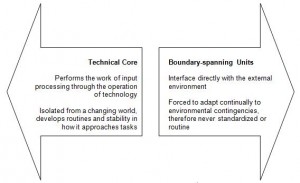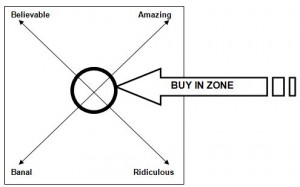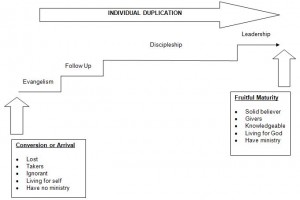Why is it that some ICF seems to be moving along as a movement and some are more stagnant? What are some factors that influence some ICF better than others? What does an ICF that striving well as a movement look like? This paper’s aim is to provide an observation about some factors why some ICF are growing as movements while some become more institutionalized. Throughout the paper, we will unfold together three factors that currently play major roles in ICFs: 1) vision/direction 2) reality check 3) strong work-force & leadership, as they are striving to grow as movements.
Vision & Direction
As we are striving both locally and collectively to pursue a course where ICF to be a movement, we need to reevaluate our assumptions in our efforts. A movement, as the word itself defined; is characterized by a movement of the entity, from a beginning point to an end point. Typically, a healthy movement will define its beginning and end point from its evaluation of its vision and its current position from achieving that vision. It is essential that a movement to have a vision, since by having a vision (or dream), it is possible then to evaluate its current position. Without a vision, there will be no comparison point to assess the current condition.
Having no vision is like walking in the dark; at this point maybe it is better to not walk at all, since any movement possesses unknown risk and may pose potential dangers. An ICF that has no vision will typically resort to a maintenance mode, where they try their best to maintain status quo. Having no vision will provide no or little spark for growth and enhancements. This will marginalize creativity, suppress risk taking, and provide no or little challenge to current leadership. Although leading a group will always be a challenge, but the challenge will be maintenance challenge, trying to fix the organization in order to make it run smoothly in a stationary state. Keeping this for a period of time will institutionalize any organization, including ICF. Therefore it is extremely important that ICFs have vision, dream, long term goal, etc.
Even if ICF has its vision, it needs to be an outward focus vision. When a vision is directed internally, it will be no different than having no vision, since most of its energy is contributed to fix and maintain its stationary state. Look at Figure 1 below1. Eventually, when this state is maintained, people will lose the zeal for the outside, and ultimately the focus of the organization will to serve itself and to benefit its members. When this happens, status quo will inevitable strived to be maintained, since a change in status quo will likely to discomfort the members.
ICF as an organization rooted on God’s commission and cause should be radically different in this area. First of all, ICF needs to have a vision, a biblical vision. The bible declares that a lack in vision will cause chaos. A biblical view of the community of believers is never to benefit itself, but to make an impact in the community, therefore ICF vision should not anchor on the benefits of its members, but it should call its members to span its boundaries to serve the community. Deriving ICF vision from solid biblical values and principles is crucial, because a vision by itself will not make a movement to happen, but the moral righteousness of the vision has to be believed fervently by the people in the group. If a vision is merely randomly created and there is no solid moral foundation for its existence, the people in the group will be having a hard time to believe it and all the more to carry it out in their life, which will require them to do a lot of sacrifices. Failing in doing this will eventually result in institutionalization of ICF, where status quo is maintained, along with stronger desire for stability, increasing bureaucracy and rules.
Figure 1 – Pawar & Eastman1
So, why is vision important? Vision in gives us direction, an appeal of direction for moving away from status quo and gain higher degree of progress. Vision also sets target, sense of scope, and a common point of reference for all.
Vision is very helpful for leaders in their leadership, since vision is the dream that excites the people and gets them going. When leaders give random thoughts and commands, it is hard to convince people to follow. But vision enables all to be able to see the bigger picture, therefore articulated well can be a driving force to sustain and excel in exciting a movement.2
In summation, George Barna puts it this way;
Vision stretches our ability, including our ability to dream, but it’s not pie-in-the-sky daydreaming. Vision entails a great depth of understanding, a detailed knowledge of facts and potential. It’s not a wild-eyed scheme born in a vacuum; rather, it’s a notion of what could occur and is deeply rooted in reality.3
But, as we will see, that having an outward focus vision is not enough.
Reality Check & Building Tension
A vision on its own will not automate an ICF in becoming a movement. ICF needs to assess itself where its current position is and compare it to the vision that is aiming for. This reality check, if being done in a regular basis, will provide a gap analysis between the desired state (vision) and the current state. This gap should be used to draw a tension that the organization has not achieved its vision. Sometimes it is useful to provide smaller periodic goals that are working toward the larger vision and draw the tension between the current state and the yearly goal. The burden of doing this is on the leadership, not the people. Often times ICFs will let its people determine the goals and objectives as well as creating the tension. Although it is important to delegate the broader of task completing and persuasion, but leadership should own and initiate the process. We will discuss further about leadership below under “Leadership”. There are 3 essential steps in doing this leadership process4:
- In the initial stage the leader must critically evaluate the existing situation or status quo. Deficiencies in the status quo or poorly exploited opportunities in the environment lead to formulation of future goals.
- The actual formulation and articulation of goals.
- The Leader demonstrates how these goals can be achieved by the organization, using “innovative and unconventional means”
The leader needs to be a credible communicator and that credibility comes from projecting an image of being a likable trustworthy and knowledgeable person. Conger and Kanungo:
“The status quo usually is presented as intolerable, and the vision is presented in clear, specific terms as the most attractive and attainable alternative.”
Therefore, it will create a healthy tension that will empower the group to move beyond status quo in pursuing their goals or vision. McCallum puts it best2:
“Good visionary leading stretches people’s credulity just the right amount. They should feel challenged by the immensity of your vision, without feeling hopeless about attaining it. We look for a point where two lines converge: the line between the banal and the amazing (or from commonplace to exceptional) and the line between people’s confidence and skepticism.”
Figure 2 – Buy-In Zone
“Where these two imaginary lines intersect is the “buy-in” zone, where people mentally and emotionally buy into the vision. They must feel that your vision is both bold enough to be worthwhile—even inspiring, and yet probably, or at least possibly doable within the current situation. Some who doubt will hang around to see if it happens. Others must embrace the vision as fully doable and pitch in to accomplish it.”
Bass, summarizes his points5;
“These leaders are able to motivate subordinates to performance levels that exceed both their own and their leader’s expectations. Transformational leaders accomplish this by raising the importance of certain goals, by demonstrating the means to achieve them, and by inducing subordinates to transcend their self-interests for the goals’ achievement.”
Strong Work-force & Leadership
Looking at the vision and the reality check, it is apparent that leadership plays a huge role in them. We have seen glimpses about leaders’ roles in a movement, and in this section we shall see what kind of leaders does it take to lead ICF to be a movement as well as what kind of leadership training that ICF needs to have to sustain the high quality of leadership.
Two trademarks or signs of a healthy movement are high expectations of people and also a high confidence in people’s ability to perform. This is impossible to achieve without a strong work-force and it will never be enough to just have a strong, charismatic, and qualified leader. But to have a strong movement, you will need a strong work-force of leaders. So, in essence, ICF needs to be a leader-rich fellowship, not just any leaders, but the work-force should also be strong, qualified, godly, and proven leaders. Leaders have to be raised because leadership will not happen automatically. Being in a position of godly leadership is not easy and will take a lot heat from the evil while also from others. McCallum argues that there are 7 conditions that can stimulate and promote leadership6,7. For further explanation on this, look at paper of “Leadership” session.
Leaders are to be servant leaders and servant leaders are characterized by their leadership, not with their lack of thinking and planning in giving people directions and vision building. Leadership should be appealing if being done properly, since each one of God’s people is gifted in certain area. Current leadership needs to define clearly scope of involvements within each level, and clearly define roles within them. Qualifications will help to clearly define pathway into leadership and recognition (not selection) are to be the main way of people getting into leadership.
Leadership in ICF should not be profane and mundane, because profane and mundane leadership empowers the immature and market driven. Spirit led leadership that are proven will strive for God’s way, since they have gone through a lot and recognized well.
Proven and strong leadership will result in a success, because the quality of a fellowship is depending on the quality of its leadership.
Ministry Paradigms
Having said about those 3 factors, ICFs typically will adopt a certain paradigm in viewing their ICF and in running their ICF. The most popular paradigm is program-based, where ICF is viewed as a set of activities, programs, and functions. This paradigm is popular because it is quite the norm for any organization. ICF, by deriving programs and activities hoping that through those functions will be able to accomplish its dreams, goals, and ambitions. therefore, success is measured by the success of its programs. Adopting this paradigm will in turn draw people and focus them into the impressive programs and to hold them in.
In a program–based ICF there are common outlooks that can be seen, such as:
- The solutions for problems are through programs. Therefore, ICF is laden with activities and programs, sometimes up to the point where most programs overlaps and pointless. In most cases, ICF can create program or programs to solve problems that are caused by different programs.
- Programs usually requires people to organize or to run them, therefore “committee” is a must have. Often the people who are running these programs are not highly qualified, but in order to have the programs running, people are “being put” as leaders
- When people are asked about their ministry, they will answer in a “program-based” context. In example: “I lead corporate singing”; “I am IT department leader”.
Figure 3 – Program-based Ministry
ICF that adopts a program-based philosophy will engage its people through programs. Program-based thinking is highly sequential, where people have to go through certain programs in the process for their development. This will create dependency on the system and results in turning the focus of ICF into maintaining its system (which in this case is its programs). An inevitable result of this focus is institutionalization, since effort being put into “technical core” increases more rapidly than “boundary spanning unit” (look at Figure 1). Therefore, it is safe to say that program-based paradigm leads to institutionalization.
For the past decade, most ICFs have been trying to develop their group and their people using program-based ministry. As we are here today, what we see is unimpressive or mediocre result, where growth is stagnant or declining, quality of leadership are degrading, and ICFs have been slow in responding to current culture and trends, because it takes too long for ICF to adapt and change itself. The trend is quite clear, that ICFs have become increasingly static and institutionalized. It is time for ICF to change its paradigm about itself to avoid being institutionalized. So, what is the alternative?
Here are some common traits of a program based fellowship (ICF):
- Leaders are categorized as organizational leaders
A common understanding among the people in the fellowship is that becoming a leader means taking an office or a committee position in leading a department. When somebody in the fellowship is asked about “what is your ministry”, the common answer will be about their organizational office; “Music Ministry”, “Small group department”, “FNF coordinator”, etc. In application, people are concern about “active duty term”, most will only serve ICF during their active duty term and glad when it is time to step down. A high number of programs means a high number of staff or committee members. Furthermore, any leadership development process (if any) is oriented to create an organizational leader.
- Leaders are “put” into their position
Usually, older leaders will pick and point and (if necessary) train people to succeed him or her. When a leader is done with his or her term in the committee or has to go home or move, they will either point somebody to replace them or recommend somebody. Sometimes, people would even leave without any replacement, and then the fellowship is scrambling to find a new leader in order to replace the older leader. This is caused by rarity in continuous leaders’ development cycle. This usually result in a small availability in potential leaders, therefore creating a continuous cycle of regeneration problem.
- Heavy investments on activities
Financial investment is heavy on creating events and activities. Fellowship agenda is laden with activities, designed to keep everybody entertained, involved and traying to attract new comers. Prayer requests are characterized with programs development and success. Resources rally together for the success of events and most leaders will be involved.
- The success of ICF is measured based on the success of its activities/programs.
If a program is running without a glitch and people are happy, a success is called upon. Failure happens when a program is not running to a completion or grind to a halt because of some reasons. Most programs or activities exist for the sake of the members, to hold them in. Some will be for non-members and some will be to resolve problems arise because of other programs.
An Alternate Paradigm
An alternate paradigm is personal ministry based paradigm, where ICF is viewed as a group of empowered individuals and their personal ministry to other people. ICF that adopts this paradigm will mostly pursue its dream, vision, and ambitions through its people. Where success is therefore measured through the quality of its people and the emphasis of the group lies in the development and empowerment of its people. This paradigm seeks to win people through personal witness, developing people through personal ministry and more interested in outward focus strategies. In perspective, therefore, the focus of the organization is to strengthen, equip, and assist people in their ministry.
Figure 4 – Personal-based Ministry
In personal-based ministry, the main focus is on the personalized development strategy of younger believer (instead of through programs), which will create the fellowship to become much more organic.
Ministry, therefore, is considered as a commitment to help people to get to know Christ or to grow from the toward maturity instead of “leading a department”.
How Does Personal Ministry Work
In the process of somebody getting to know Christ and growing in Him into maturity, generally there are 4 areas that need to be worked on; Evangelism (or outreach), Follow-Up, Discipleship, and Leadership. Therefore, in empowering people in their personal ministry, these are the 4 areas that ICF should focus on. In addition, the main job or focus of ICF is to facilitate its people to be able to do their personal ministry, not to create “programs” or “events” in doing the ministry.
An analogy for this like this; imagine if ICF is an entity of a professional sport team. The main focus of the management team (or ICF leaders) in this case is to facilitate the players (or team), so they can perform and do what they suppose to do (like practicing, game-day, press conference, play-off games, etc). The owner of the team and the management team do not mainly focus on creating regulations of the game, or even play the games themselves. They facilitate so the players (ICF people) can do their games (ministry).
- Evangelism
Most personal ministry starts when somebody is doing the work of evangelism to another. There are cases where the other person is already a believer, which would skip the need for evangelism. This is an initial work where the gospel is shared and people usually extend an invitation for the new person to come to ICF meetings (such as small group, FNF, SNF, party, etc).
- Follow-Up
When the person first come to any ICF events (generally speaking, each ICF may have different definitions of what an “ICF event” is), the work becomes the work of follow-up. Follow up is the process where usually the new person are challenged by the gospel and asked to invite Jesus into his/her life and become a Christian. Beyond that, they are usually challenged to take steps in starting in basic means of growth (reading bible, prayer, etc). People who are still in follow up stage usually still have a lot of friends that are non-believers. With the excitement of new-found relationship with Christ and a lot of opportunities for evangelism, it is best to start to teach them about evangelism right away. By doing this, it also empowers them to start their own personal ministry right away and to start applying the little they have learned about having relationship with Christ so far. Follow up usually ends when the person is committed to grow and well incorporated in the body of Christ
- Discipleship
Follow up will gradually become a discipleship relationship when the new person becomes serious about his/her growth and wants to become a committed worker for God. In some ICFs, this process usually happens in a small group bible study. This is where the majority of the work of personal ministry is being done while it can easily be the longest, time consuming, costly, heart-breaking, tearful, but extremely rewarding work. People who are willing to be discipled usually have shown serious efforts to start a personal ministry of their own, although it mostly still consist of evangelism and follow up. During this process, the discipler and the disciple will commit to meet regularly in order to help the disciple be more effective in his/her personal ministry.
- Leadership
Leadership is the pinnacle of personal ministry. When a person have gained followers and in a personal way have influenced their followers to be radically changed by Christ, this person can be recognized as a leader. In this phase the, the discipler work is done, where he/she has nurtured growth of the younger person up to maturity and completeness in Christ. At this point it is by no means that the younger person should stop and there is nothing else to learn. But, a leader is expected to be self-learning and able to “digest solid food” without being fed constantly anymore. Usually recognizing somebody as leader is a moment of celebration, because it means a success of ministry and in turn a success of ICF as a fellowship. Notice that the meaning of leadership here is a leadership of people and not programs or departments.
Personal ministry dictates that ICF must focus on “boundary spanning unit”, that is in empowering its people so they can do their ministry, including ministry to those outside of the circle of ICF (evangelism and follow-up).
Figure 5 – Areas of Personal Ministry
Concluding Thoughts
Through out generations, if ICFs to remain in this cycle (program based paradigm), they will eventually lose their initial movemental force and become institutionalized. This is a stark picture of reality, so far off from where we want our ICF to be. So, what are we going to do? Let us exercise with diligence our vision building for campuses, be real in doing our reality check, and continually to develop our strong workforce as well as helping other campuses to do the same thing and break them out of the cycle of institutionalization.
ICF will need to examine itself in regard of its paradigm. For the last decade, our current paradigm has yielded mediocre results and for some even devastating result. Are we to remain in status quo in regard to this? Status quo means taking the easy path but leads to inevitable institutionalization. Or are we going to change in our paradigm and adopt personal ministry based paradigm and strive as a movement?
Resources
1 Pawar & Eastman, “The nature and implications of contextual influences on transformational leadership: A conceptual examination,” Academy of Management Review (22:1) 1997
2 Dennis McCallum, “Vision and Christian Leadership”, Xenos Christian Fellowship
3 George Barna, “The Power of Vision”, Regal Books, 2003
4 Conger & Kanungo, “Charismatic Leadership in Organization”, Sage Publications, 1998
5 Bass, “Transformational Leadership”
6 Dennis McCallum, “What Makes Someone a Christian Leader?”, Xenos Christian Fellowship
7 Dennis McCallum, “Toward Leader – Rich Church”, Xenos Christian Fellowship, 2002
Further Readings
Max DePree, “Leading without Power: Finding Hope In serving Community”, Jossey-Bass, 1998
Edgar Schein, “Organizational Culture and Leadership”, Jossey-Bass, 1996
Max Weber, “Charisma and Institution Building”, University of Chicago Press, 1968
Martin Robinson, “Invading Secular Space: Strategies for Tomorrow’s Church”, Kregel, 2004
Thom Rainer, “Breakout Churches: Discover How to Make the Leap”, Zondervan, 2005
Jim Peterson, “Church without Walls: Moving Beyond Traditional Boundaries”, NavPress, 1991





